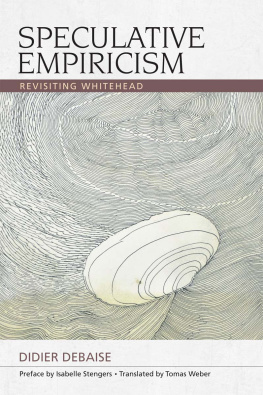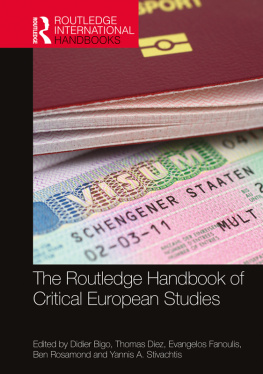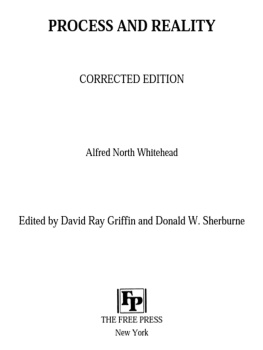Speculative Empiricism
Speculative Realism
Series Editor: Graham Harman
Editorial Advisory Board
Jane Bennett, Levi Bryant, Patricia Clough, Iain Hamilton Grant, Myra Hird, Adrian Johnston, Eileen A. Joy.
Books available
Onto-Cartography: An Ontology of Machines and Media, Levi R. Bryant
Form and Object: A Treatise on Things, Tristan Garcia, translated by Mark Allan Ohm and Jon Cogburn
Adventures in Transcendental Materialism: Dialogues with Contemporary Thinkers, Adrian Johnston
The End of Phenomenology: Metaphysics and the New Realism, Tom Sparrow
Fields of Sense: A New Realist Ontology, Markus Gabriel
Quentin Meillassoux: Philosophy in the Making Second Edition, Graham Harman
Assemblage Theory, Manuel DeLanda
Romantic Realities: Speculative Realism and British Romanticism, Evan Gottlieb
Garcian Meditations: The Dialectics of Persistence in Form and Object, Jon Cogburn
Speculative Realism and Science Fiction, Brian Willems
Speculative Empiricism: Revisiting Whitehead, Didier Debaise, translated by Tomas Weber
Forthcoming books
After Quietism: Analytic Philosophies of Immanence and the New Metaphysics, Jon Cogburn
Infrastructure, Graham Harman
Visit the Speculative Realism website at: edinburghuniversitypress.com/series/specr
Speculative Empiricism
Revisiting Whitehead
Didier Debaise
Translated by Tomas Weber

Edinburgh University Press is one of the leading university presses in the UK. We publish academic books and journals in our selected subject areas across the humanities and social sciences, combining cutting-edge scholarship with high editorial and production values to produce academic works of lasting importance. For more information visit our website: edinburghuniversitypress.com
Didier Debaise, Un empirisme spculatif. Lecture de Procs et ralit de Whitehead Librairie Philosophique J. Vrin, Paris, 2006.
http://www.vrin.fr
English translation Tomas Weber, 2017

Translated with the financial support of the University Foundation of Belgium
Edinburgh University Press Ltd
The Tun Holyrood Road, 12(2f) Jacksons Entry, Edinburgh EH8 8PJ
A CIP record for this book is available from the British Library
ISBN 978 1 4744 2307 6
The right of Didier Debaise to be identified as the author of this work has been asserted in accordance with the Copyright, Designs and Patents Act 1988, and the Copyright and Related Rights Regulations 2003 (SI No. 2498).
Contents
Series Editors Preface
Although the great English philosopher Alfred North Whitehead (18611947) was born more than a century too early to be a Speculative Realist, he was without question speculative, and without question a realist. Hence there is no question that a well-executed book on Whitehead belongs in this series; Didier Debaise himself has expressed full agreement on this point. In the seventy years since his death, Whitehead has not quite secured the place in the Western philosophical canon that will one day surely be his. While philosophy for a century and more has been polarised between the Anglo-American analytic and Continental European traditions, Whitehead falls helplessly into a crack between the two. He is perhaps too speculative and wisemanish to impress the mechanical engineers of analytic philosophy who, if they admire Whitehead at all, do so only because of his mathematical work with their icon Bertrand Russell. This attitude is best symbolised by A. W. Moores stunning omission of Whitehead, obviously a master metaphysician, from his book The Evolution of Modern Metaphysics: an otherwise warmly inclusive volume that reaches across the aisle to welcome such debonair continental figures as Bergson, Heidegger, Derrida, and even the snowball-throwing Deleuze.among American process theologians such as Charles Hartshorne (pronounced Hearts Horn) and John Cobb. Whitehead was as revered in these circles as he was ignored or chuckled over in the others.
The opening of new continental doors for Whitehead commenced with some positive references by Gilles Deleuze, who long made a habit of drawing our attention to important figures half- or fully forgotten: Albert Lautman, Gilbert Simondon, tienne Souriau, Gabriel Tarde. In The Fold, his widely read book on Leibniz, Deleuze refers to Whitehead glowingly as Leibnizs rightful successor, and as provisionally... the last great Anglo-American philosopher before Wittgensteins disciples spread their misty confusion, sufficiency, and terror.
Debaise the philosophical author has much in common with Debaise the person: formal, polite, soft-spoken, and also observant, tenacious and innovative. In her Preface below, Stengers is quick to note what is also one of my own favourite aspects of Debaises book: his reminder that for Whitehead, philosophy is As Lakatos teaches, there are never decisive experiments in the history of science, because every scientific theory is born already falsified by counter-instances: for example, hundreds of unresolved problems in the gravitational theory of Newton before Einstein was even born. A scientific theory, like a philosophical one, is not a bundle of irrefutably rigorous arguments. Instead, it is a research programme that might gradually come to be seen as either progressive or degenerating, but not overthrown by a single strong counter-argument.
Another powerful aspect of Debaises book is his unusual awareness of the decisions guiding his own particular reading of Whitehead. Above all, he pays close attention to Whiteheads concept of societies, as distinguished from the actual entities that are often seen as analogous to the Leibnizian monads. The central claim of his book, Debaise reports, is that experience is defined by the particular relations between what Whitehead calls societies. The concept of societies, then, is given a central place, in so far as it crystallises the relations between method and existence. The speculative project locates the key to its relation with experience through this concept. Debaise is fully aware of Whiteheads rather unorthodox use of the word society, which is not exclusively human and sometimes not human at all, as when molecules or stars form societies of their own. And here we find ourselves outside the orbit of mainstream post-Kantian philosophy, which is so narrowly concerned with relations involving humans and world, and so convinced that nothing can be said about nonhumannonhuman relations that is not already said better by the natural sciences. Debaise is too natural a speculative thinker to give in to such artificial and premature restrictions on the subject matter of philosophy. Indeed, he is perfectly suited as an interpreter of Whitehead, whom he reads not just accurately, but beautifully. I have long been puzzled by the lack of an English translation of this highly regarded book, and am proud that this series has made such a translation possible.
Graham Harman
Dubuque, Iowa
January 2017
A. W. Moore, The Evolution of Modern Metaphysics: Making Sense of Things (Cambridge: Cambridge University Press, 2012).
Gilles Deleuze, The Fold: Leibniz and the Baroque, trans. Tom Conley (London: Continuum, 2006), p. 86.












